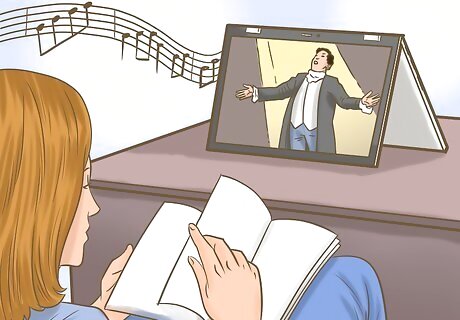
views
Hitting Opera Notes

Warm up your voice. Try an exercise called elevator slides as a great way to warm up your voice and reduce vocal cord injury. Make a noise that sounds like a long, slow siren while making an “ah” sound. Start out as low as you can go, ascend to as high as you can, and go back down. Repeat this several times, experimenting with different vowel sounds, such as “ee” and “ooh.” Keep your throat relaxed, especially as you get to the high notes, to help the notes not catch in your throat. If your voice still sounds stiff, consider that outside factors like being nervous about singing in front of a new teacher might be impacting your sound rather than technique itself. In that case, try to resolve the emotional stories interfering with your voice.

Take a slow, deep breath in. Fill your lungs with air just like you normally would, except keep going to allow your lungs to really expand. Try to inhale through your nose, and take your time to get a good solid breath. Try not to make any sound when breathing in. Inhaling slowly will help you avoid making a sound. If you can hear yourself taking your breath in, there is tension in your breath. This tension will be audible in your out-breath while you're singing.

Keep your diaphragm expanded to support your voice throughout each note. To find out where your diaphragm is, put your hands firmly around your waist and cough. The muscle that pushed your hands out is your diaphragm. When you take a deep breath, your diaphragm expands; it should stay expanded throughout the duration of the phrase you're singing until it's time to draw a new breath in. Try keeping your hands around your waist when you're starting out, to be sure that you're supporting your voice with your diaphragm.

Sing from middle C and up two octaves to see if you have a soprano voice. Soprano is the highest range of the female voice. To see if you fall into this range, play a middle C on a piano or keyboard and match the note with your voice. Do the same thing for all notes up to the C two octaves above middle C. Coloratura sopranos, a subset of the soprano category, are actually able to sing the third F above middle C and sometimes higher. If you are unable to strongly hit the highest C, you may be a mezzo-soprano.

Try the G below middle C and up two octaves to A for a mezzo-soprano voice. Mezzo-soprano is the mid-range female voice. They are often supporting or villainous roles in operas, though some French operas have lead role mezzos. Use a piano or keyboard to try and match the mezzo notes to determine if this is your voice range.

Sing the F below middle C to the F one octave above it for contralto and countertenor voices. Contralto is the lowest female voice range, and countertenor is the highest male range; these ranges consist of almost the exact same notes. The only difference is that countertenors generally cannot hit the lowest F, so that range actually starts from the G below middle C and goes up an octave to F. True contralto voices are so rare that contralto roles are often given to mezzo sopranos. Countertenors often use a falsetto, or head voice, technique to reach their high notes. If you're a female with a low voice, or a male with a high voice, you may fall into these voice ranges. Use a piano or keyboard and try to match the notes to find out. To increase the lower end of your vocal range, think about relaxing your voice rather than moving towards vocal fry as an alternative to that deeper sound.

Try the C below middle C to the C above it to see if you have a tenor voice. Tenors usually have the male lead roles in opera. Like the other voice ranges, there are subset categories within the tenor range that are more particular for different types of roles. Lyric tenors are able to easily hit the highest notes in the range, and generally get roles of charming young men, whereas dramatic tenors generally are most comfortable in the middle of the range and get robust, muscular characters for roles.

Sing the second G below middle C to the G above it if you have a baritone voice. This is the mid-range male voice. Play the notes on a piano or keyboard and try to sing along with them to see if this is your range. Baritone roles are often comic or villainous in nature.

Try the E above middle C to the E two octaves below if you have a bass voice. Bass voices, the lowest of the male range, often get older, comic, or supporting roles in operas. If you're a male and have a pretty low singing voice, try to match the low notes on a piano or keyboard to find out if this is your range.
Reading Opera Music

Learn to read sheet music. To know what notes you should be singing in an opera role, you'll need to be able to read music. You can teach yourself how to read music using books or online tutorials, or take lessons through a vocal instructor. Search "how to read music" to find online resources and instructors near you. Or, check out books on reading music from your local library. Learn the basics by studying the Staff, and then learn the notes on the Treble and Bass Clefs. Get used to the different types of notes and what they mean, and then move onto learning about more complex features like meter, time, and melody.

Familiarize yourself with Italian, German, or French. It is helpful to understand the meaning of what you're singing in opera, because operas are essentially dramas that are sung. You'll also want to be sure that you're pronouncing words correctly. Try using a language-learning app or checking out books at the library to become familiar with the basic grammar and vocabulary of the language of your favorite opera.

Watch videos of operas while reading the words. Browse videos and audio clips online and check your local library for recordings of operas. As you listen to these recordings, follow along with the written script. Observe the movement and facial expressions of the opera singers to help you become familiar with operatic acting techniques. If you can, find operas that provide English translations to help you better understand the story.
Improving Your Singing

Train with a professional instructor. An instructor can help you learn different voice patterns, modulation, and voice throwing techniques that are commonly used in opera. Look up “opera instructors near me” on the web to find a teacher in your area. Many larger cities have opera organizations that offer group voice classes or private lessons for a monthly fee. In addition to an achievement-oriented approach to practicing singing, don't forget to allow yourself to have fun with sound too. Think about how you can support your voice with curiosity, love, and playfulness rather than simply focusing on technique and discipline.

Join a local singing group. Reach out to your local church choir, singing club at school, or other community singing group. Any opportunity to sing will improve your confidence and your singing skills. A few useful websites to search local singing opportunities include Choralnet at https://www.choralnet.org/ and the Contemporary A Capella Society of America at https://casa.org/. These websites allow you to search your zip code to find singing opportunities in your area.

Attend live opera performances. To get the full opera experience, you should go to live shows in addition to watching videos and listening to recordings of opera. Being in an opera house during a performance will give you an idea of just how skilled a professional opera singer is. Look up “operas near me” to find live operas in your area. Keep in mind that opera singers usually do not use microphones. So, when you are seeing a performer, they are making their voice carry throughout the theater themselves.

Audition for local operas to perform live. When you feel ready to sing opera professionally, put yourself out there by auditioning. Websites like YAP Tracker and Playbill.com have audition sections for upcoming live operas. You can also search "opera casting calls near me" on the Internet to find auditions for local live operas. Visit https://www.yaptracker.com/ to access opera audition postings or https://www.playbill.com/job/listing to see multiple Broadway job postings and auditions.




















Comments
0 comment